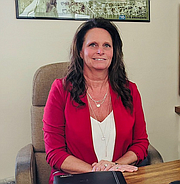BOCC responds to former commissioners' accusations
WALLACE –– The Shoshone Board of County Commissioners has come under fire in recent weeks from previous board members concerning the duties of the current board.
During a public hearing, former commissioner Jay Huber stated that, due to the number of hours that were being worked, the current board had received a raise.
“You three commissioners all got a raise this year as soon as you took over in January because you went from four days a work week to three, without taking a pay cut. So you’re only in the office 24 hours a week, so you’re making $43.50 an hour and that’s if you’re here – because I’ve noticed that half the time you guys aren’t here.”
Huber also highlighted that during Commissioner Dave Dose’s previous stint as a county commissioner, the board reduced its work week from five days a week to four.
Huber’s concerns were echoed in a recent guest opinion to the News-Press by former commissioner John Hansen, who wrote: “The previous commissioners worked four days a week, approximately 32-40 hours a week, and were available 24/7. Many times on weekends, holidays, and nights – one or all of us were called out. The new commissioners work maybe two days a week, 5-10 hours a week. They did not get a raise by getting a dollar increase, but working fewer hours at the same pay is a raise. Commissioners' salaries and benefits are paid by the county, and everyone who owns property in Shoshone County pays taxes which go to pay their salaries.”
Dose explained to the News-Press that the BOCC traditionally serves in a part-time capacity; but now, they have rearranged their hours in order to work throughout the week, including hours outside of the brick-and-mortar of the Shoshone County Courthouse resulting in more hours per month on average and at the same pay as in the past.
This was backed up by statements made by Commissioner Tracy Casady, who explained how the office of the commissioners is different from other county offices.
“We schedule our meetings appropriately and make ourselves available to the public via several means of communication,” Casady stated. “We are not comparable to offices that require services that are provided daily to the public such as the clerk's office with recording, passport application processing etc. Same with the assessor and treasurer’s offices who provide services necessary for the public to conduct daily business.”
Without leveling accusations at the previous board – which Casady was a part of for four months following her appointment to the seat in August 2022, Dose detailed how the board spends their time away outside of their office.
His explanation included the point that following their swearing-in, the new board decided to change the way hours would be structured in order to increase their productivity.
“Instead of working 3-4 days a week in the office whether there was work to be done there or not, we have organized to focus our meetings on three days a week at the courthouse and to spend the rest of their time as needed – where needed - including Mondays, Fridays and often on weekends,” Dose said. “This includes taking care of citizen needs, meeting remotely when efficient, answering citizen mail and email, conducting site visits, researching county issues, training, visiting areas of the county that don’t often see commissioners, and working in their own districts on more local issues.”
Dose believes that the issues between the two parties come down to a matter of perspective and the definition of service.
“The current board is more focused on meeting citizens where they are needed and not just waiting for folks to come to Wallace during set office hours,” he said.
The BOCC is a unique body of local government – due largely to the vast responsibilities that they have.
They operate as a legislative, executive, and judicial body, with duties that include the passing of ordinances, and assembling and adopting budgets to name just a few things.
“We are charged with the duty of supervising the official conduct of all county officers as their conduct relates to public monies and revenues, as well as supervising appointed boards and committees,” Casady told the News-Press. “The BOCC also acts as the Board of Equalization. The Board sits as a quasi-judicial body to hear various matters including planning and zoning requests, property valuation protests and requests for cancellation of taxes, and indigent issues.”
Dose and the rest of the board seem to believe that these accusations are something of a smokescreen to draw attention away from the problem at hand – an ongoing budget crisis that the county is navigating.
“As to why such a rumor would get started in the middle of a budget meeting, one can only speculate,” Dose said. “The board was in the middle of discussing why the county suddenly finds itself $3 million short this year and examining why the county commissioners and budgeting officials in the recent past had overcommitted to spending a couple million dollars a year more than the county actually takes in in annual revenue. How did the county end up with such an unbalanced budget that it would allow the past officials to commit funds the county can’t cover with current income in the immediate future? The current board has had to take drastic measures just to pass a legal budget this year, forgoing any COLA raises for the employees, cutting budgets in every department, using foregone tax credits, increasing taxes, and even committing to spending $1.7 million in one-time monies from the sale of county properties – all just to balance the budget for 23-24.”
At the direction of the Idaho State Controller, the board has retained an outside auditing firm with experience in government budgets that will be conducting a forensic audit on the last several budgets to potentially determine the cause of the overspending and who may have been responsible.



